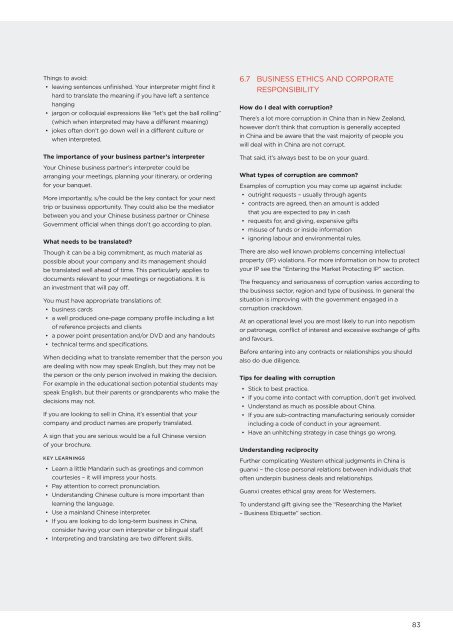Navigating China Guide (2012) - New Zealand Trade and Enterprise
Navigating China Guide (2012) - New Zealand Trade and Enterprise
Navigating China Guide (2012) - New Zealand Trade and Enterprise
You also want an ePaper? Increase the reach of your titles
YUMPU automatically turns print PDFs into web optimized ePapers that Google loves.
Things to avoid:<br />
• leaving sentences unfinished. Your interpreter might find it<br />
hard to translate the meaning if you have left a sentence<br />
hanging<br />
• jargon or colloquial expressions like “let’s get the ball rolling”<br />
(which when interpreted may have a different meaning)<br />
• jokes often don’t go down well in a different culture or<br />
when interpreted.<br />
The importance of your business partner’s interpreter<br />
Your Chinese business partner’s interpreter could be<br />
arranging your meetings, planning your itinerary, or ordering<br />
for your banquet.<br />
More importantly, s/he could be the key contact for your next<br />
trip or business opportunity. They could also be the mediator<br />
between you <strong>and</strong> your Chinese business partner or Chinese<br />
Government official when things don’t go according to plan.<br />
What needs to be translated?<br />
Though it can be a big commitment, as much material as<br />
possible about your company <strong>and</strong> its management should<br />
be translated well ahead of time. This particularly applies to<br />
documents relevant to your meetings or negotiations. It is<br />
an investment that will pay off.<br />
You must have appropriate translations of:<br />
• business cards<br />
• a well produced one-page company profile including a list<br />
of reference projects <strong>and</strong> clients<br />
• a power point presentation <strong>and</strong>/or DVD <strong>and</strong> any h<strong>and</strong>outs<br />
• technical terms <strong>and</strong> specifications.<br />
When deciding what to translate remember that the person you<br />
are dealing with now may speak English, but they may not be<br />
the person or the only person involved in making the decision.<br />
For example in the educational section potential students may<br />
speak English, but their parents or gr<strong>and</strong>parents who make the<br />
decisions may not.<br />
If you are looking to sell in <strong>China</strong>, it’s essential that your<br />
company <strong>and</strong> product names are properly translated.<br />
A sign that you are serious would be a full Chinese version<br />
of your brochure.<br />
KEY LEARNINGS<br />
• Learn a little M<strong>and</strong>arin such as greetings <strong>and</strong> common<br />
courtesies – it will impress your hosts.<br />
• Pay attention to correct pronunciation.<br />
• Underst<strong>and</strong>ing Chinese culture is more important than<br />
learning the language.<br />
• Use a mainl<strong>and</strong> Chinese interpreter.<br />
• If you are looking to do long-term business in <strong>China</strong>,<br />
consider having your own interpreter or bilingual staff.<br />
• Interpreting <strong>and</strong> translating are two different skills.<br />
6.7 BUSINESS ETHICS AND CORPORATE<br />
RESPONSIBILITY<br />
How do I deal with corruption?<br />
There’s a lot more corruption in <strong>China</strong> than in <strong>New</strong> <strong>Zeal<strong>and</strong></strong>,<br />
however don’t think that corruption is generally accepted<br />
in <strong>China</strong> <strong>and</strong> be aware that the vast majority of people you<br />
will deal with in <strong>China</strong> are not corrupt.<br />
That said, it’s always best to be on your guard.<br />
What types of corruption are common?<br />
Examples of corruption you may come up against include:<br />
• outright requests – usually through agents<br />
• contracts are agreed, then an amount is added<br />
that you are expected to pay in cash<br />
• requests for, <strong>and</strong> giving, expensive gifts<br />
• misuse of funds or inside information<br />
• ignoring labour <strong>and</strong> environmental rules.<br />
There are also well known problems concerning intellectual<br />
property (IP) violations. For more information on how to protect<br />
your IP see the “Entering the Market Protecting IP” section.<br />
The frequency <strong>and</strong> seriousness of corruption varies according to<br />
the business sector, region <strong>and</strong> type of business. In general the<br />
situation is improving with the government engaged in a<br />
corruption crackdown.<br />
At an operational level you are most likely to run into nepotism<br />
or patronage, conflict of interest <strong>and</strong> excessive exchange of gifts<br />
<strong>and</strong> favours.<br />
Before entering into any contracts or relationships you should<br />
also do due diligence.<br />
Tips for dealing with corruption<br />
• Stick to best practice.<br />
• If you come into contact with corruption, don’t get involved.<br />
• Underst<strong>and</strong> as much as possible about <strong>China</strong>.<br />
• If you are sub-contracting manufacturing seriously consider<br />
including a code of conduct in your agreement.<br />
• Have an unhitching strategy in case things go wrong.<br />
Underst<strong>and</strong>ing reciprocity<br />
Further complicating Western ethical judgments in <strong>China</strong> is<br />
guanxi – the close personal relations between individuals that<br />
often underpin business deals <strong>and</strong> relationships.<br />
Guanxi creates ethical gray areas for Westerners.<br />
To underst<strong>and</strong> gift giving see the “Researching the Market<br />
– Business Etiquette” section.<br />
83
















